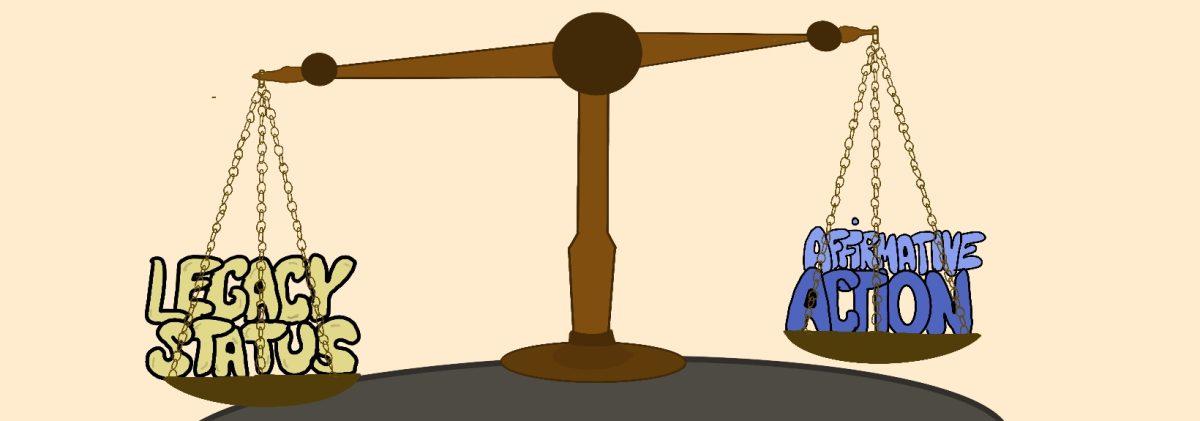Legacy admissions are a highly problematic practice in college admissions, and as conversations about the abolition of affirmative action surface, we must advocate for the abandonment of legacy consideration.
Stress stemming from the college application process is something many college students have experienced. Many students are frustrated with race being considered during admissions, and the majority of Americans oppose affirmative action. Affirmative action is a practice designed to remedy discrimination against applicants by offering opportunities to minority groups. While the Supreme Court recently heard an affirmative action case that received national attention, the conversation surrounding unfair considerations in college admissions has failed to spotlight legacy admissions — arguably a more pressing issue.
Legacy admissions are the practice of a college offering preferential treatment to the descendants of alumni during the admissions process. This factor in admissions prioritizes familial legacy and tradition, encouraging multiple generations of family members to attend the same university. Legacy admissions rely on generations of educated family members, thus often prioritizing wealthy students. In turn, they perpetuate a cycle of educational inequality.
Legacy admissions are more common among highly competitive universities. More than 36% of Harvard’s class of 2022 are students with a family member who attended the college, according to The Harvard Crimson, Harvard’s college newspaper. According to a 2018 survey of admissions directories by Inside Higher Ed, 6% of public institutions and 42% of private institutions consider legacy status as a factor in admissions. Legacy is established as a significant factor at elite universities — especially significant because these schools provide unique benefits such as networking connections and average higher starting salaries among alumni. Competitive public universities also take legacy into account as a factor during the application process, with the University of Virginia being an example.
While legacy admissions are less relevant for schools like MU, the issue has ramifications for the entire American college system. Legacy admissions favor wealthy students that come from an educated family, which could limit educational opportunities for lower income and first-generation college students. Class preference disguised as tradition upholds opportunity gaps and inequality that are currently present in the American higher-education system. The MU Alumni Association currently has a legacy program that offers scholarships to students who have a parent or grandparent who’s an alum. To date, the Alumni Association has offered $800,000 in total legacy scholarships to students with a parent or grandparent who previously attended MU. MU’s Columns Award is an additional scholarship starting at $15,000 provided to incoming nonresident students. According to the MU Admissions website, MU can consider legacy status when offering this scholarship. These types of programs deserve to be replaced with scholarships that could benefit a wider range of students.
As students, criticizing policies that reinforce classist privilege and uphold systemic barriers should be prioritized when discussing education reforms. The admissions process of private universities has an effect on that of less selective public universities such as MU by shaping the distribution of students across universities by class.
Until legacy admissions are banned at a national level, students should resist this practice by supporting universities that do not take legacy admissions into account and by discouraging the use of legacy as leverage over other students.
Affirmative action is under attack, with critics often claiming it is harmful because it provides preferential treatment to members of historically oppressed minority groups and, by doing so, stigmatizes them and creates an unfair application process. However, affirmative action is intended to be a solution to the inequality created by historically racist institutions that prioritized admitting white men before educational opportunities were opened up to more members of the public. While affirmative action is a flawed solution to diversity and cost barriers in the education system, it is clear it aims to solve a problem. Legacy admissions are an outcome of an educational system that rewards multigenerational wealth and education, and despite this, the Supreme Court continues to hear affirmative action cases. Universities continue to consider legacy as a factor during the admissions process. It’s time to finally call out legacy admissions for what they are — preferential treatment by class and a practice that is holding us back.
Edited by Molly Gibbs | [email protected]
Copy edited by Grace Knight and Sterling Sewell














